SINGAPORE – Singaporeans and permanent residents keen on furthering their studies at the Nanyang Technological University (NTU) will be able to receive a $5,000 subsidy for coursework-based master’s programmes from 2024.
Such programmes are designed for university graduates who want to advance their knowledge in chosen specialisations through courses and electives.
Those eligible for financial aid may receive up to $10,000 in subsidy.
These one-off subsidies apply to both part-time and full-time programmes, which typically last one to two years.
On top of this, all NTU alumni – regardless of nationality – will also receive a 10 per cent tuition fee rebate when they enrol in these programmes.
Over 5,200 students are expected to benefit from these financial support measures, which are part of the university’s efforts to make postgraduate education more accessible.
NTU president Ho Teck Hua said on Saturday: “These new subsidies serve as an added incentive, making lifelong learning at NTU more accessible to all Singaporeans and permanent residents, and to our alumni.”
The majority of postgraduate by coursework programmes at the autonomous universities are not funded by the Education Ministry, as opposed to programmes that are based on research, which receive government funding.
The National University of Singapore (NUS) had said in 2022 that it had begun moving towards a self-funded model for the majority of its master’s by coursework programmes in 2020. Selected programmes still receive subsidies.
From the academic year 2023/2024, fresh intakes of Singaporeans and permanent residents get a 10 per cent tuition fee rebate when they enrol in a self-funded master’s degree by coursework programme at NUS.
NUS alumni of any nationality receive an additional 5 per cent discount.
NTU has a total of 95 master’s by coursework programmes, 88 of which are self-funded.
The cost of such programmes range from $32,000 to $124,000.
Mr Marcus Chan, 28, who graduated from NTU in 2020 with a chemical engineering bachelor’s degree, said: “The subsidies are quite substantial and a master’s programme becomes a more financially viable option.”
He wants to pursue further studies in the field of technology, possibly in the areas of fintech or artificial intelligence, and plans to apply for a master’s programme in the next one to two years.
The algorithmic engineer in a start-up firm received a graduate certificate in fintech essentials from NTU after going through a three-month course.
“Our industry is quite competitive, so it’s not uncommon to have bachelor degrees. Having a master’s would help you stand out a bit more,” he said.
“Bachelor’s degrees teach you fundamentals, and you have to take many courses that may not be directly relevant to your interest, but master’s programmes are quite niche, so you can really focus on what you want to learn.
“It’s also important to keep abreast of new developments, like in AI, where things are changing so rapidly,” he added.


